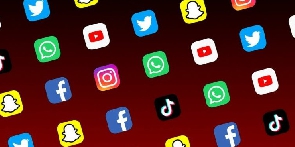Opinions of Friday, 10 February 2023
Columnist: Isaac Ofori
Innovation and social media in Ghana’s political discourse
Ghana's political landscape had undergone a dramatic upheaval since the turn of the 21st century. The organizing of political campaigns and the dissemination of political messages to Ghanaians have undergone a paradigm shift due to various forms of innovation.
With increasing access to social media via mobile phones, Ghanaian politicians have discovered new ways to market themselves and sell their ideology to people. Even though the target demographic is young people, it is important to note that since the mobile phone invasion in Ghana, adults have also caught up with mobile phone usage.
Ghanaians have become accustomed to using the internet in all aspects of life, and the rate at which online activities are expanding is amazing. Social media are driving this information explosion. Facebook and WhatsApp are the most popular social media platforms utilized by Ghanaians. Twitter can be defined as an elite platform, and a constrained algorithm has restricted its widespread use.
Facebook usage is widespread among young people, however, Whatsapp appears to be the network that even the least educated can access. With the increasing penetration of social media into the culture of digitization among Ghanaians, politicians have developed strategies and marketing techniques for their campaign messages.
On Whatsapp networks, party planning and information dissemination are commonplace. With the development of Whatsapp groups, political activists merely need to invite their agents or assigns or apparatchiks to these platforms for information to be exchanged in the blink.
With available features such as voice, video, and image sharing, it has become easier to disseminate political messages. It no longer matters what level of education a person has because information can now be presented in a variety of formats that even the uneducated can comprehend.
Through paid advertisements, information might reach tens of thousands of Facebook users. This has practically altered the narrative employed in the nation's political discourse.
On social media, political organizations, political activism, radio talks, and television shows are accessible. With television and radio, Facebook hosts political chat shows that may be viewed, downloaded, and shared on other social media platforms.
Therefore, the introduction of social media into our political discourse has important ramifications for the democratic destiny of the nation. When properly regulated, the use of social media could change politicians' campaign messages and direct them to focus on policies rather than propaganda and populism. Again, social media could affect voters' perceptions and enable them to make decisions that can shape the nation's development plan.
However, the risks linked with the use of social media in our political debate significantly outweigh the benefits. Ghana's Internet usage is not adequately regulated. This poses a threat to our political system because it encourages hooliganism and other sorts of social misfit behaviour.
Politicians could use social media to promote violence and hate campaigns, disseminate false information, and trade in harmful misinformation to advance their agendas. This has the potential to reverse our democratic successes and create political instability in the country.
To sustain the relevance of social media use in our political discourse, it is essential that, actions be made to ensure that adequate regulation directs the use of social media to put a check on usage without necessarily restricting freedom of use, but rather promoting the right to use appropriately.
Although we recognize the significant role that social media plays and will continue to play in our political discourse, a failure to educate the public about the dangers of misusing the media might have severe consequences for our democracy.
Ghana has a bright future with rising digital technologies, but it is crucial to realize that the benefits could be undermined by the obstinate usage of these communication platforms.
Watch the latest episode of Talkertainment below:













